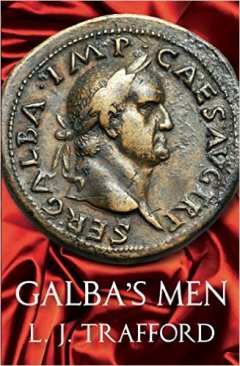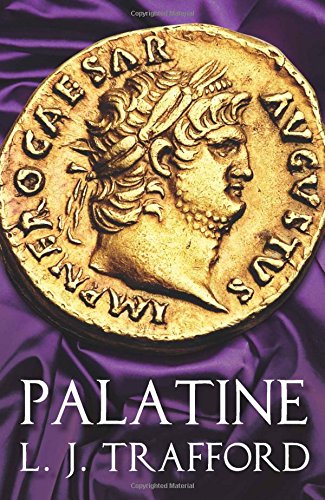
Roughly halfway through her new book, Galba’s Men, there is a passage describing the new emperor’s reaction to attending games in Rome:
“Galba had no particular love for the games. He’d seen real action and considered gladiator bouts as mere play: overdone and false. Yet he attempted a tight smile and waved as required.
It appeared genial to the palace staff, who were used to their grim-faced master. But the people, accustomed to cheery, flamboyant Nero, were not so enamoured of their new emperor. Casting sly looks at him in-between the entertainment, they saw a hook-nosed, scrawny old man with thinning white hair who looked almost bored by the proceedings.”
This, in a nutshell, encapsulates a number of issues faced by Galba and many other emperors, especially those who assumed power during the Year of the Four Emperors. There was a fine line to be traversed, negotiating the balance between pleasing the Senate, the people, and the military. Here, by being less adept publicly than the previous, crowd-pleasing ruler Nero, Galba is already failing to win over the public. He soon also has issues with the military, thus quickly tipping the balance in favour of a new (or, to be historically accurate, two new) usurpers of the imperial throne.
In her second book chronicling the tumultuous year of AD 68-69, L.J. Trafford once again combines history and fiction to bring forth an accurate, yet hugely entertaining narrative of the lives, loves, and quite a few deaths, of those whose lives revolve around the heart of Roman rule. Picking up a few months after the deaths of Nero and Sabinus, the Praetorian Prefect who led the revolt to install Galba as told in Palatine, Rome eagerly awaits the arrival of her new emperor. Many of the slaves and freedmen who keep the imperial bureaucracy running are still reeling from the fallout of the events earlier in the year, but are eager to start over, and hope for a return to normalcy. A similar desire is echoed amongst the military men and citizens we encounter. Galba, unfortunately, is plagued from the outset not only by the normal intrigues and machinations of his underlings, but also by his stubborn belief in a return to the moral, economic, and traditional view of Rome that few of its citizens seem to share with him.This, in effect, is what ultimately leads to his downfall.
In a note concluding the book, Trafford, echoing the words of Tacitus, indicates that Galba was, on paper at least, capable of being an outstanding emperor. He is a serious, older man, with years of military and political experience, who had served under four emperors (he first took public office as a praetor in AD 20, during the reign of Tiberius). He wanted to eliminate bribery of the Praetorian Guard and the army, the flashy displays of gladiatorial games and athletic contests, and restore the treasury that Nero had decimated with wanton building programmes and gifts. In other words, Galba wanted to get down to the serious business of restoring Rome to the good old days before the debauchery and carelessness of Caligula and Nero, but found a citizenry that had little recall, and even less interest, in his plans. Enter Otho, a man (as Trafford portrays him), with all the charisma, good-will, and charm that Galba lacks and then some, who devotes most of his time to winning favour amongst the Senate, the people, and the Praetorian Guard. Though somewhat hapless in some of his dealings (Poor Philo! Poor Straton!), Otho seemingly gets the necessity of striking the right balance, and is eagerly anticipating being named Galba’s heir so that he will have a chance to help the people of Rome in the manner he sees fit. When Galba passes him over, Otho is understandably mortified, and the rest, as is said, is history.
Thus, the book plays out over the seven months from when Galba seized power to his death, when Otho, with the help of the Praetorian Guard, the army, and a mob of Roman citizens, took control of the city. Like the first in the series, the story is woven of real and fictional characters, largely focusing on the slaves and freedmen who comprise the day to day workforce of the government and the imperial palace. This allows a certain amount of freedom for creating characters and situations that are necessary for attracting an audience and keeping them engaged from book to book (Really, what will Sporous get up to next? And how has that flibbertigibbet Mina survived so long?), but I think also is quite clever for historical purposes. Despite the lack of visibility on the historiographies of the period, it is likely that the turmoil of this year was felt most keenly by those closest to the rotating seat of the emperor: the members of the imperial household and the guard. It is the Praetorian Guard particularly who, like with the downfall of Nero, play a major role in the end of Galba’s reign. Otho seemingly understands the importance of having these people on side, and looks to be in place to be the kind of emperor that Rome both wants and needs. Unfortunately, the book ends with a note that Vitellius is on the march from Germany….
Despite knowing the history, I can’t wait to see what happens next.
*Disclosure: The author, L.J. Trafford, asked if I would be willing to review this book as I had the first in the series, and thus sent me a copy so that I could do so.

